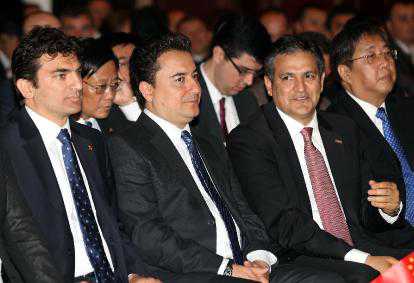By Stefan Wagstyl in London and Daniel Dombey in Istanbul
A new battle line between the Turkish state and the country’s banking sector has been drawn this week with the launch of a competition investigation into 12 of Turkey’s top banks.
For the government’s supporters Ankara’s stance on banks is a plus: the authorities getting tough with anti-competitive practices in business. For critics it’s a minus: the administration growing too big for its boots.
Ali Babacan, Turkey’s powerful deputy prime minister responsible for the economy, backed the regulator’s right to launch the probe. He said: “We need real competition in the sector; the banks should not be fixing prices and rates.”
Officials and people in the industry said the competition inquiry focused on credit cards – a key factor in Turkey’s economy, given lending growth, the unsecured nature of credit card loans and associated fears that more such loans could turn sour.
The competition authority said the probe would look at banks including Turkish private and state-owned institutions such as GarantiBank, Akbank, Isbank, Yapi Kredi, Ziraat Bankasi and Halkbank as well as foreign groups such as HSBC and ING.
Although Turkey’s banks are well capitalised and the country’s level of household debt is low, some experts depict credit cards as a particular concern – because of their role in stoking consumer spending and the risk their high cost could make it impossible for some borrowers to pay back their loans.
Referring to the new competition inquiry, Babacan says “there were some doubts about how credit card interest rates were set.” He specifies that the probe, which is the responsibility of the country’s competition board, is “just an investigation at this stage”.
Some observers expect the inquiry to take a year or so to conclude after initial seizures of bank data this week. Still, the process has teeth; earlier this year the regulator fined seven banks TL72.3m for colluding over a payroll contract.
The announcement of the latest probe comes after 12 months in which the central government, and Babacan in particular, have sought to persuade banks to rein in credit expansion and so slow down the Turkish economy’s rate of growth, which has contributed to the country’s hefty current account deficit.
Ankara has relaxed the campaign of late, but after the banks initially resisted Babacan’s message the central bank and the banking regulator also stepped in to curb lending growth. In a related move, regulators took action to limit consumers’ use of credit cards to take money from ATMs.
Babacan also argued in his FT interview that Turkey’s regulatory agencies were independent but had to operate within rules set by the government and parliament.
Answering questions about an August decree law that put 10 regulatory agencies under government supervision – including the competition authority and the banking regulator – he said: “We can’t have independent institutions which are like independent countries; we cannot have a republic of the banking authority or a republic of the central bank.”
He added: “Creating a legal framework is the responsibility of the government and of parliament. Independent bodies take their decisions within that framework. It’s for government and for parliament to change the framework.”
via Turkey: regulators v banks | beyondbrics | News and views on emerging markets from the Financial Times – FT.com.





